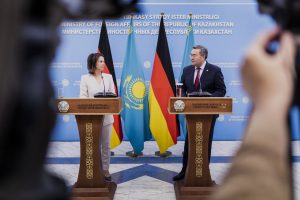On the heels of EU Council President Charles Michel’s visits to Astana and Tashkent last week, this week German Foreign Minister Annalena Baerbock is treading a similar path with similar goals.
In a statement before the visit, Baerbock did not hide the overarching geopolitical intent of her visit.
“Russia’s war against Ukraine is causing all the successor states of the Soviet Union to wonder whether they, too, might sometime face a challenge to their sovereignty,” a statement attributed to Baerbock and posted on October 30 began. The statement went on to conclude, “In order to make use of the opportunities, we must at last push forward with networking central Asia with Europe more effectively.” In a jab arguably intended for Moscow, Baerbock stated that “Germany and Europe offer honest and fair opportunities that are not intended to create new dependencies or rely on financial leverage.” In closing, the German minister highlighted that “[t]o my mind, a partnership between equals means making it clear over and over again that economic development and human rights are two sides of the same coin.”
In previewing the trip to Central Asia, the German Foreign Ministry highlighted Uzbekistan’s large population and Kazakhstan’s large energy reserves, in addition to the fact that 85 percent of all German trade with Central Asian countries is with Kazakhstan.
Baerbock stopped first in Astana, Kazakhstan’s capital, on October 31 where she met with top Kazakh officials including Kazakh Prime Minister Alikhan Smailov and Foreign Minister Mukhtar Tileuberdi.
The German Foreign Office distilled Baerbock’s press conference with her Kazakh counterpart into three main points: A recognition of Kazakhstan’s interdependencies with Russia and praise for its having “taken a stand for international law”; the country’s green hydrogen potential; and a statement that “[s]ustainable growth will only take place where human rights are guaranteed.”
During the visit, Baerbock announced that Germany would open a “hydrogen diplomacy” office in Astana, with ambitions to become a “a hub for the exchange of experts and responsible people from both countries in the future” with the aim of reducing emissions. Also in the green energy vein is a recently announced $50 billion deal under which Dresden, Germany-based Svevind Energy Group will partner with Kazakhstan to build a 20 gigawatt green hydrogen plant powered by wind and solar. According to Bloomberg, “The electrolysers [at the plant] will be able to produce up to 2 million tons of green hydrogen per year from 2032, the equivalent to about one-fifth of the EU target for imported green hydrogen in 2030.”
More than Michel did during his visits to the region, Baerbock hammered home a connection between respect for human rights and sustainable development.
On November 1, Baerbock met with her Uzbek counterpart, Vladimir Norov, in Tashkent. According to reporting from the German paper, Frankfurter Allgemeine Zeitung, “Baerbock said that Germany wanted a partnership on an equal footing, with no tricky loans, and with transparency.” One could read that as a bar aimed at both Russia and China. She framed, again, economic success as a product of stability and improvements in human rights.
Baerbock is accompanied on her trip to Central Asia by a German business delegation, described in some media as comprised of energy and infrastructure specialists. Her visit to Uzbekistan will conclude with a trip to Samarkand, to see an irrigation project being built with Berlin’s support as well as a mining operation.
Energy and business considerations form the core of Europe’s connections to Central Asia, and Russian aggression in Ukraine is the proximate motivation for seeking deeper ties at this precise moment. Baerbock, more so than Michel, made an effort to bridge German — and European — concerns in the human rights sphere with wider economic and political ambitions. It’s an effort to push both Kazakhstan and Uzbekistan toward the conclusion that if they want to see their respective reform programs succeed they can’t ignore human rights commitments, while at the same time offering support in those efforts at a time when the region’s other partners — Russia and China — may be otherwise engaged.
































